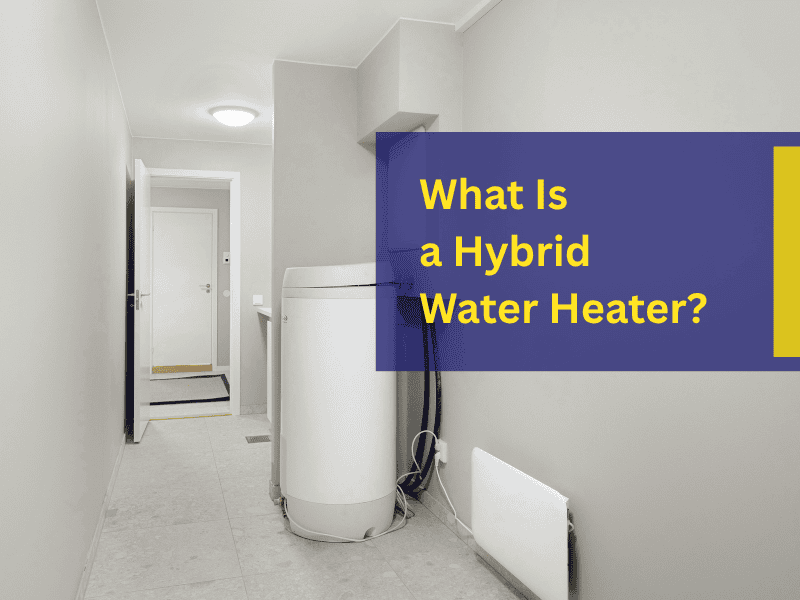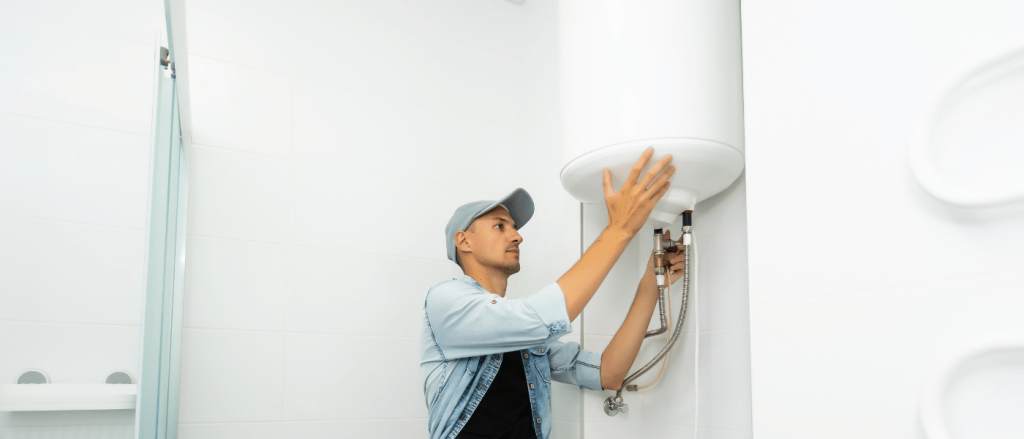
What Is a Hybrid Water Heater? A Complete 2025 Guide for Washington Homeowners
If you’re a Washington homeowner exploring energy-efficient ways to heat water, you’ve probably asked: what is a hybrid water heater and is it worth it? With rising utility costs and a growing push toward sustainability, hybrid water heaters are gaining traction across Pierce, Thurston, and South King County. This guide explains how they work, their pros and cons, and why they’re becoming a popular upgrade for homes in the Pacific Northwest.
Introduction to Hybrid Water Heaters
What is a hybrid water heater?
A hybrid water heater, also called a heat pump water heater, combines the technology of a traditional water heater with that of an energy-saving heat pump. It uses electricity not to directly heat the water, but to move heat from the surrounding air into the water tank. This innovative method makes it far more efficient than conventional systems. When considering water heating solutions in Washington, many homeowners first ask: what is a hybrid water heater, and how does it compare?
Why Washington homeowners are switching to hybrid systems
Homeowners in cities like Tacoma, Olympia, Kent, and Auburn are making the switch due to:
- Increasing electric utility costs
- State and local rebate programs
- A growing emphasis on green home upgrades
- The need for consistent, reliable hot water in variable climates
Quick comparison with traditional and tankless systems
| Feature | Traditional Tank | Tankless | Hybrid Water Heater |
|---|---|---|---|
| Energy Efficiency | Low | Medium to High | Very High |
| Upfront Cost | Low | High | Medium to High |
| Space Requirements | Medium | Low | High |
| Ideal Use | Basic hot water | On-demand usage | Daily family usage |
| Lifespan | 10–12 years | 20+ years | 13–15 years |
How Does a Hybrid Water Heater Work?
Heat pump technology explained
A hybrid system uses a heat pump mounted on top of the water tank. This pump draws in ambient air from the room and transfers the heat to the water. Think of it like a refrigerator in reverse. Compared to gas or electric-only systems, this method is far more efficient.
Energy efficiency mechanism
Instead of generating heat like traditional water heaters, hybrid systems move heat from the air using advanced heat pump mechanisms. This helps reduce operating costs significantly in homes throughout Western Washington. Many residents first learn how energy-efficient they are when they ask, what is a hybrid water heater?
Differences from tankless and conventional storage heaters
- Conventional water heaters use electric elements or gas burners to heat stored water.
- Tankless water heaters provide hot water on demand but often require higher energy output during peak use.
- Hybrid water heaters store and preheat water efficiently using heat pump technology, reducing long-term energy consumption.
What Are the Benefits of a Hybrid Water Heater?
Lower utility bills and energy efficiency
Hybrid water heaters can cut electric water heating costs by up to 70%. Households in Lakewood, Lacey, and Tumwater are benefiting from this energy-efficient alternative.
Reduced environmental impact
Lower energy use means a reduced carbon footprint. Hybrid water heaters support eco-friendly home improvement goals across Washington’s green-conscious communities.
Rebates and incentives in Washington
Washington homeowners may qualify for rebates from Puget Sound Energy and Tacoma Power. These rebates help offset installation costs and make hybrid water heaters more accessible.
Long-term cost savings
Though more expensive initially than traditional systems, hybrid heaters offer:
- Lower monthly utility bills
- Fewer breakdowns
- Reduced repair frequency
- Longer system lifespan
Are There Any Downsides to Hybrid Water Heaters?
Initial cost and installation requirements
Hybrid units typically cost more upfront, ranging from $1,500 to $2,800. Installation must be handled by professional plumbing services to ensure safe and compliant setup.
Space and ventilation considerations
Unlike tankless models, hybrid water heaters require adequate ventilation and space. A utility room, basement, or garage is ideal.
Maintenance needs
They are relatively low-maintenance, but they do require:
- Cleaning the air filter
- Flushing sediment buildup
- Monitoring the heat pump’s performance
Hybrid vs Tankless vs Traditional Water Heaters: Which One Is Right for You?
Upfront cost comparison
- Traditional units: $400–$1,000
- Tankless models: $2,000–$4,000
- Hybrid water heaters: $1,500–$2,800
Lifespan and maintenance
- Traditional systems last 10–12 years with regular flushing
- Tankless water heaters can last over 20 years with descaling
- Hybrid heaters typically last 13–15 years with minimal maintenance
Performance in cold Washington winters
Tankless units may falter in extremely cold temperatures. Hybrid water heaters, however, use electric resistance backup, ensuring consistent performance even in winter.
Ideal use cases for each type
- Traditional: Best for budget-focused or short-term housing
- Tankless: Great for smaller households with low simultaneous usage
- Hybrid: Perfect for energy-efficient, long-term family homes in Western Washington

What Are the Signs You Should Switch to a Hybrid Water Heater?
Rising energy bills
An increase in your monthly electricity bill may indicate your current water heater is underperforming. Hybrid systems lower long-term operating costs significantly.
Inconsistent hot water supply
Experiencing temperature drops during showers? Hybrid water heaters maintain consistent hot water through stored preheated reserves.
Outdated tank-style system
Older tank models, especially those over 10 years old, are less efficient and prone to failure. Upgrading to a hybrid water heater offers better reliability and fewer repairs.
Need for eco-friendly upgrades
Hybrid water heaters qualify for ENERGY STAR ratings and support Washington’s energy-efficient home improvement incentives. If you’re wondering what is a hybrid water heater and whether it’s environmentally friendly, the answer is a clear yes.
How Much Does a Hybrid Water Heater Cost in Washington?
Average unit cost
The average price for a hybrid water heater in Washington ranges from $1,500 to $2,800, depending on capacity and features.
Installation cost range (Pierce, Thurston, South King County)
Installation costs vary between $600 and $1,000. Plumbing professionals assess factors like ventilation, space, and existing water heater setup to determine the final price.
Available state and utility rebates
- Puget Sound Energy: up to $500
- Tacoma Power: up to $600
- Federal rebates (Inflation Reduction Act): up to $1,750
ROI timeline for homeowners
Most Washington homeowners recover their investment in 3 to 6 years through energy savings, reduced repair needs, and rebate incentives. This further explains why more people are searching what is a hybrid water heater and how much it can save them.
Why Choose Professional Hybrid Water Heater Installation?
Proper sizing and placement
Professional installation ensures the heater is correctly sized for your household’s needs and installed in a ventilated space.
Warranty protection and compliance
Most manufacturers require installation by licensed (License # CONVEWH782OL) plumbing experts for warranty coverage. DIY installs may lead to voided coverage or improper performance.
Safe integration with home systems
Hybrid heaters must be correctly connected to your home’s electrical and plumbing systems. Expert installers ensure compliance with local codes.
Long-term service and support
When you hire Convenient Water Heaters Plumbing LLC, you receive:
- Expert installation
- Ongoing repair and maintenance support
- Timely water heater replacement options when needed
Hybrid Water Heater Maintenance Tips for Washington Homes
Cleaning the air filter and condensate drain
Dust and debris reduce heat pump performance. Clean the air filter and check the condensate drain every few months.
Annual professional inspections
Having a plumber perform an annual check ensures your hybrid water heater maintains optimal efficiency.
Smart thermostat usage for efficiency
Use built-in smart controls to schedule heating cycles, monitor usage, and reduce energy waste when away from home.
Common FAQs About Hybrid Water Heaters
Do hybrid water heaters work in cold climates like Western Washington?
Yes. Hybrid water heaters include electric backup to ensure consistent hot water, even in colder climates like Thurston and South King County.
How long do hybrid units last?
When professionally installed and maintained, most units last between 13 and 15 years.
Can I use my existing plumbing setup?
In most cases, yes. However, minor upgrades may be needed for optimal performance and to meet manufacturer requirements.
Are hybrid water heaters noisy?
They produce a low hum similar to a refrigerator. When placed in utility rooms or garages, the sound is barely noticeable.
Serving Area: Local Expertise Across Western Washington
At Convenient Water Heaters Plumbing LLC, we bring reliable, energy-efficient water heater installation and plumbing services to households across Western Washington. We proudly serve:
Pierce County, Thurston County, and South King County, including Tacoma, Puyallup, Lakewood, University Place, Lacey, Olympia, Tumwater, Kent, Auburn, and Federal Way.
Our licensed team ensures your hybrid water heater is installed, serviced, and supported by professionals who care about quality and efficiency.
Ready to Upgrade? Contact Convenient Water Heaters Plumbing LLC Today
Thinking about upgrading your water heater? Now’s the time. At Convenient Water Heaters Plumbing LLC, we make the process easy from consultation to installation.
We offer:
- Free consultations
- Transparent pricing
- Local plumbing services by experienced professionals
Our commitment to service, energy efficiency, and expert installation has made us a trusted name across Pierce, Thurston, and South King County. Whether you need repair, installation, or full water heater replacement, we’re here to help.
Contact us today to schedule your consultation and discover how a hybrid water heater can transform your home’s energy use.
- Get A Quote
- Phone: (253) 368-1064

Leave A Comment